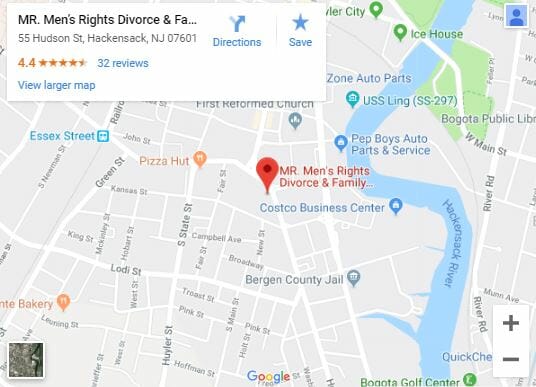Please Note: Our practice focuses on cases that occur in New Jersey.
While co-parenting and parallel parenting sound similar, these are actually two very different ways for parents to raise their children after a divorce.
Divorcing spouses who treat each other with civility and respect and are able to communicate effectively may be able to enter into a co-parenting arrangement. In this arrangement, parents work closely together to raise their children. On the other hand, when former spouses are antagonistic and disrespectful toward each other post-divorce, a parallel parenting arrangement limits their interaction with each other while allowing each parent their own separate time with children.
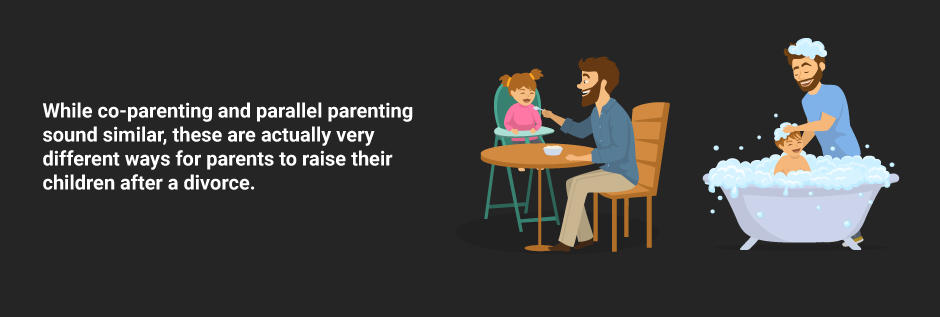
WHAT IS CO-PARENTING AFTER A DIVORCE?
Co-parenting is a post-divorce parenting arrangement in which both parents continue to jointly participate in their children’s upbringing and activities. They make cooperative decisions on issues affecting their children and may both attend children’s activities, and even family events. This arrangement involves a substantial amount of interaction between the parents, in public and in private.
In order for it to work successfully, both parents need to be fully committed to maintaining civility and setting aside any differences between them for the benefit of their children.
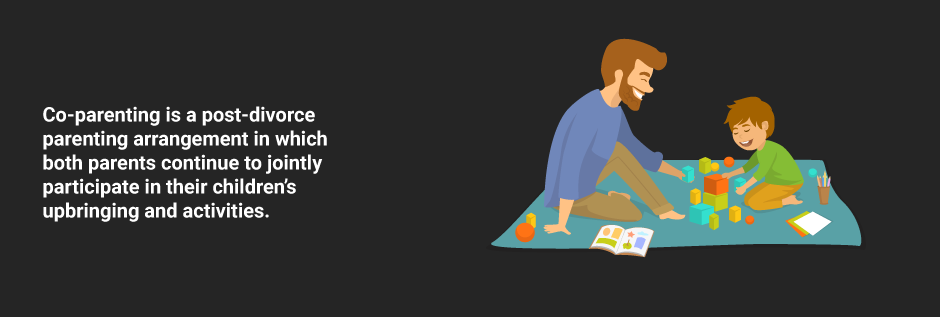
When divorcing spouses choose to co-parent, they must develop a co-parenting plan as part of the divorce process. This plan is designed to help ensure that they are “on the same page” enough to co-parent effectively and to proactively address issues together. A co-parenting plan should decide important issues related to education, health care, and religion, including stipulating concepts such as what school district the children will attend (Mom or Dad’s?) and that there needs to be a meeting of the minds as to choosing a medical care provider for the children, along with what medical insurance plan they will be under, and what religious upbringing, if any, they will have. A comprehensive co-parenting plan will also address such things as how discipline will be handled, who will pick up and drop off for school and extracurricular activities, where kids will spend the holidays, and more. It is up to you how detailed and specific or categorical you want to get with these plans, and that decision should be based on how well you and the other parent have worked together in the past as partners in parenting.
When parents put a detailed co-parenting plan in place that they both agree to, opportunities for conflict are minimized. When parents agreeably adhere to their co-parenting plan, children receive the benefit of more consistency and stability in their home environments and less disruption to their daily lives.
Co-parenting after a divorce isn’t the answer for everyone. Obviously it will not work for parents in contentious relationships. But when it does work, it can help children and parents alike better cope with life after the marriage has ended.
WHAT IS PARALLEL PARENTING?
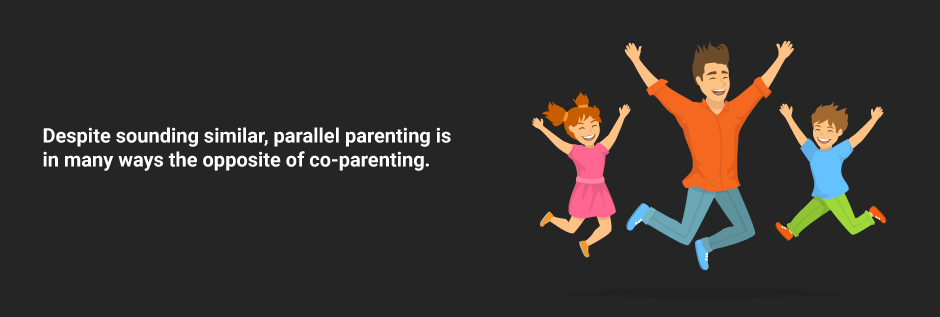
While it sounds similar, parallel parenting is in many ways the opposite of co-parenting. When parents are constantly in conflict and unable to communicate effectively, the parallel parenting model allows the parents to spend time with their children independently to minimize the risk that their hostile relationship will be harmful to their children.
Rather than structuring a co-parenting plan that fosters joint interaction between the parents and their children, divorcing spouses will develop a parallel parenting plan that minimizes the need for interaction between them as much as possible. A parallel parenting plan can stipulate which parent will attend what school event or go to which soccer game or other activity, for example.
Due to the nature of relationships requiring parallel parenting, developing a parallel parenting plan often means going to the New Jersey court and having a judge establish a plan based upon the arguments and evidence presented by both spouses and their respective attorneys.
In circumstances that call for parallel parenting, the parents will typically need to establish legally-enforceable rules and requirements regarding issues such as:
- Speaking negatively about the other parent in front of the children
- Using the children as an intermediary for communications
- Decision-making authority regarding shopping, friends, curfew, extracurricular sign-ups, and similar child-related matters
- Appropriate times for communicating outside of their children’s presence
- Monitoring and scheduling children’s communications with one parent during the other’s parenting time.
There are myriad issues to think about and address when establishing a parallel parenting plan. Your divorce lawyer can help you consider the issues and possibly negotiate a plan with your ex-spouse or, if that fails, stand up for your rights and interests before the court.
THE MORE TRADITIONAL ALTERNATIVE: PARENTING TIME AND VISITATION
While co-parenting and parallel parenting are options under the appropriate circumstances, many divorcing parents will find that their best option is still to structure a more traditional parenting time and visitation schedule. If you and your spouse are willing to put your children’s best interests first but you aren’t interested in maintaining an active relationship once your marriage is over, then establishing parenting time and visitation rights will likely be your best option.
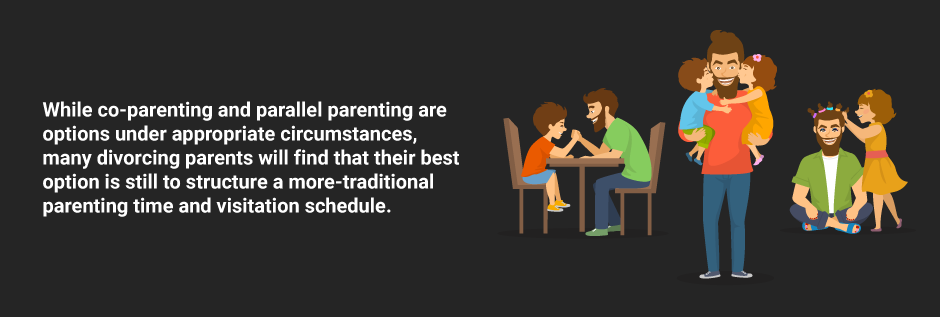
If you can agree between yourselves on a parenting time schedule, the court can sign off on it. If you cannot agree, the court will decide for you based on the best interests of the child. Judges review a long list of legal factors to determine custody and parenting time/visitation arrangements that are in a child’s best interests. Factors include the relationship of each parent with the child, the stability of the home environment, the child’s needs, whether domestic violence has been an issue, how well the parents communicate with each other, and several other considerations.
There are two basic types of child custody in New Jersey: legal custody and physical (otherwise known as residential) custody. Parents may share legal custody, which gives both parents the authority to make important and major decisions for the child. The parent the child lives with more often may have primary physical custody, also called residential custody, but both parents are subject to the parenting or visitation schedule that will ultimately be determined. . In other cases, parents may share physical custody equally.
SCHEDULE A CONFIDENTIAL CONSULTATION WITH AN EXPERIENCED HACKENSACK, NJ, DIVORCE ATTORNEY
If you are contemplating divorce in New Jersey and would like more information about the options that are available for protecting your relationship with your children, we encourage you to contact us for a confidential case evaluation. To speak with an experienced family law attorney at [MFR] Men’s & Fathers’ Rights Divorce Lawyers, please call (201) 880-9770 to schedule a consultation.

